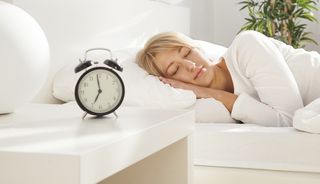Surveys Reveal the Most Common 'Sleep Thief'

When people don't get enough sleep, it's usually because they sacrifice snooze time for hours at work or commuting to the office, a new study suggests.
Researchers asked people how they spent their time over the past day and analyzed the responses of more than 120,000 Americans ages 15 or older in a telephone survey called the American Time Use Survey, which was conducted by the U.S. Department of Labor. The surveys were conducted from 2003 to 2011.
People who said they slept for 6 hours or less the previous day had worked about 1.5 hours more on weekdays, and 1.8 hours more on weekends or holidays, than people who got between 6 and 11 hours of sleep. The people who slept 6 hours or less also started work earlier in the morning and stopped work later in the evening, the researchers said.
People who worked multiple jobs were 61 percent more likely to report sleeping 6 or fewer hours on weekdays. In contrast, people who were self-employed were 17 percent less likely to get 6 hours or less of sleep a night than those who worked in the private sector. It's recommended that people get between 7 and 9 hours of sleep per night. [What If We Didn't Need Sleep?]
“The evidence that time spent working was the most prominent sleep thief was overwhelming,” said study author Dr. Mathias Basner, an assistant professor of sleep at the University of Pennsylvania Perelman School of Medicine.
What's more, short sleepers (people who slept for 6 hours or less a night), spent more time traveling (including commuting), and started their traveling earlier in the morning, than people who were normal sleepers.
There was a link between starting work or school later and getting more sleep: For every hour that work started later in the morning, a person's sleep time increased by about 20 minutes. On average, people who started work before or at 6:00 a.m. slept for only 6 hours, while those who started work between 9:00 a.m. and 10:00 a.m. slept about 7.3 hours.
Sign up for the Live Science daily newsletter now
Get the world’s most fascinating discoveries delivered straight to your inbox.
One way to decrease sleep loss in the population would be to delay work and school start times, or shorten commute times, Basner said.
The study is published in the December issue of the journal Sleep.
Follow Rachael Rettner @RachaelRettner. Follow Live Science @livescience, Facebook & Google+. Original article on Live Science.

Rachael is a Live Science contributor, and was a former channel editor and senior writer for Live Science between 2010 and 2022. She has a master's degree in journalism from New York University's Science, Health and Environmental Reporting Program. She also holds a B.S. in molecular biology and an M.S. in biology from the University of California, San Diego. Her work has appeared in Scienceline, The Washington Post and Scientific American.
Most Popular



